On 22 April 2011, Kaname Madoka used the most powerful of wishes to save all magical girls. About eight years later, I watched her do it, and it taught me something about the savior of the real world and his plan for humanity.
I am of course talking about Puella Magi Madoka Magica, which celebrates its tenth anniversary this season. It was the fifth anime series I ever watched, and the one that led me on the path that now has me writing with the crew here on Beneath the Tangles. Madoka showed me that Proverbs 25:2 applies to anime, too (“It is the glory of God to conceal a matter, and the glory of kings to search it out”), and it’s our joy here at BtT to search him out in this particularly rich field!

What I learned from Madoka was not what you might expect. True, the Messianic parallels are pretty strong in episode 12, but so too are the Buddhist threads, and I think I was equally struck by all that is not Christlike with that episode—by which I mean not so much Madoka’s wish itself, which is full of grace, but the way it transforms her into a transcendent concept, distant from the world and forgotten by it (I’ll explore the controversial implications of this, as played out in the sequel movie, Rebellion, in my post tomorrow).
No, instead what gave me pause was Madoka’s conversation with Sayaka, when she explains why she did not simply wish for a cosmic Control+Z and undo the entire magical-girl-wish-to-witch-curse cycle. Madoka wants to preserve Sayaka’s wish and “all the hard work you did for it,” she explains, because it is “precious.” Something good came of the magical girls’ wishes, and so instead of dismantling the system, Madoka seeks to inject it with grace by bearing the burden of the curses personally. The magical girls still pay with their lives, but they die in peace, their legacies untarnished.
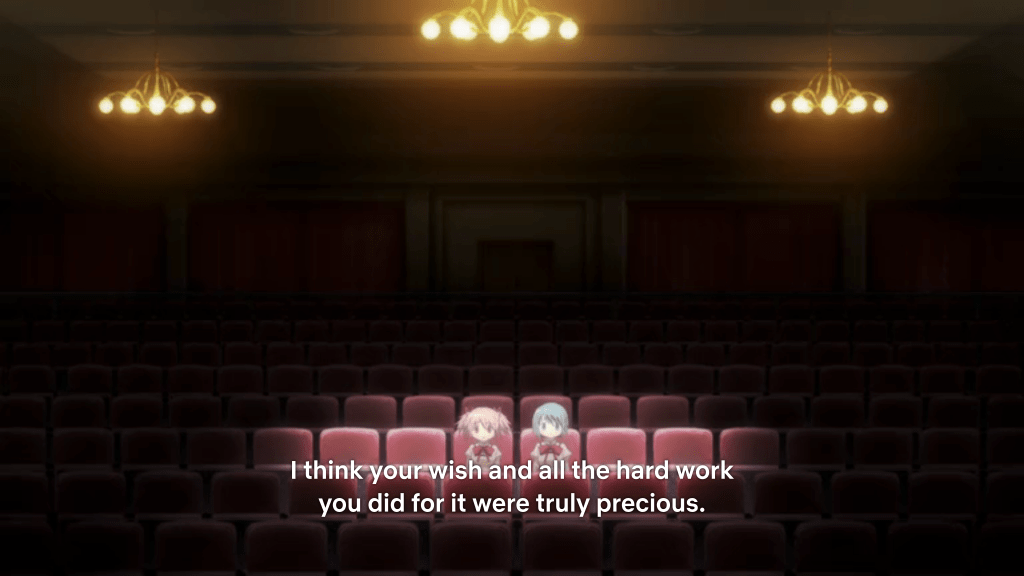
This conversation helped me to see the fall of humanity in a completely different way.
But before I explain, let me walk it back for a moment: how exactly does God speak through anime? There are of course loads of different ways that he helps us to understand something about him, ourselves, and living out our faith through the stories brought to life in anime. Sometimes, it’s a line of dialogue that is exactly what you needed to hear in that moment, maybe an encouragement, a challenge, or a pearl of wisdom. Or maybe something that you disagree with so strongly that it causes a situation in your own life to come into sharp focus, and you suddenly know what not to do.
Sometimes, it’s a plot arc or character development that parallels a challenge you have faced yourself. Seeing it play out on the screen—and maybe in an alternate world!—can give you the perspective you need to see your own situation with fresh eyes; or maybe it just helps to smooth away the anxiety, knowing you’re not the only person ever to face such things.
Anime is rich in allegory and metaphor—which I kind of think are the original language of the Bible!—and sometimes its symbolism and parables can have a personal meaning for us that speaks volumes that may not have been intended by the studio, but were woven into the fabric of the show by the greatest Author (and Editor) of all.
Sometimes, it’s the tenderness and beauty conveyed in a show’s artistry that speak comfort, love, and hope when you need it most (Violet Evergarden, Non Non Biyori, Laid-Back Camp, A Place Further than the Universe, I’m looking at you). There are even a few anime that feature Christian characters (and not all are villainous) and quite a few more that quote or paraphrase scripture, sometimes even helpfully (PsychoPass, Le Chevalier d’Eon, ViVid Strike). These are all powerful ways that the Holy Spirit can use this beautiful medium to touch our hearts and strengthen our souls, as he speaks a language that we know and love—the language of anime.
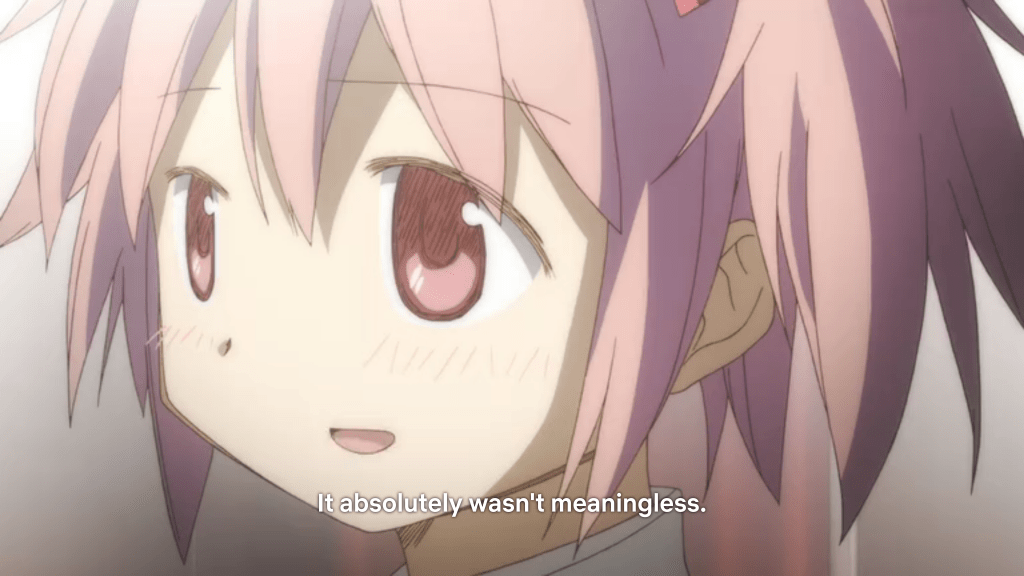
There’s another way too, that anime can draw us closer to our God, and that’s through prompting us to ask him questions. So often, we are reluctant to question God because we’re afraid that it is a marker of unbelief, but that’s not the case at all. He welcomes genuine questioning (e.g. Isaiah 1:18). After all, questions are how we get to know someone, and often they’re how we lead up to pouring out our own hearts. We ask questions because we want to hear the answers, but also because we want to be heard ourselves. Questions are core to building relationship and growing in intimate friendship.
Madoka’s conversation with Sayaka made me ask God some questions.
It made me wonder why God didn’t simply reset everything at the very beginning, in the Garden after the fall. I mean, he did to some extent in Noah’s day, but it wasn’t a hard reset; more of a reboot. The implications of that illicit feast of fruit persisted. But why didn’t he scrap Humanity 1.0? I began to wonder if God had a reason like Madoka’s.
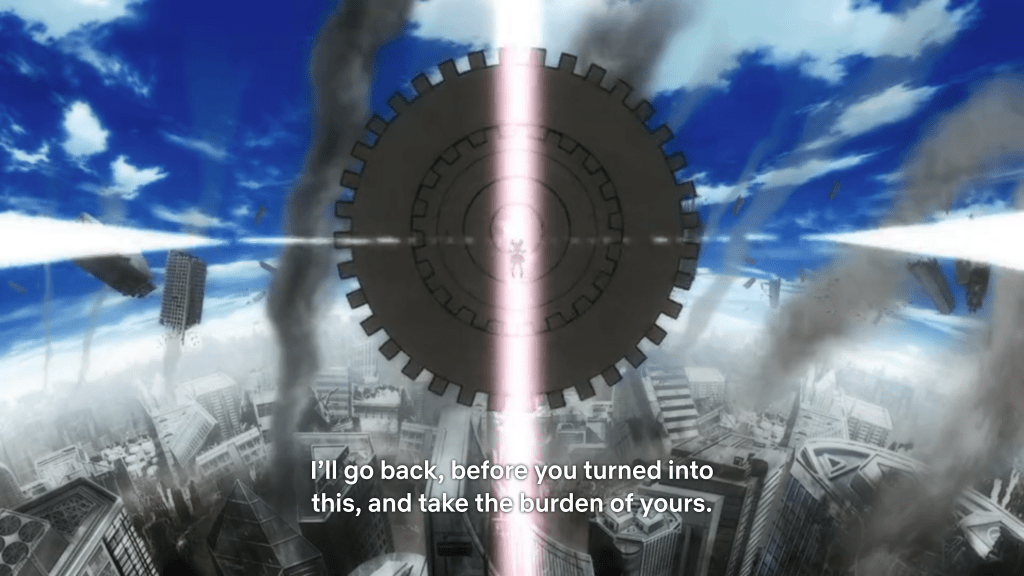
When I did, I realized that I’ve misunderstood the purpose of the trees in the Garden. You know, the Tree of Eternal Life and the Tree of the Knowledge of Good and Evil (the forbidden fruit tree!). I’ve always taken for granted that they were there to be a temptation, a test. After all, “love isn’t love unless there’s a choice,” right? With the trees and God’s command not to eat their fruit setting up the choice for humanity—the chance to choose to love and trust God. Don’t get me wrong, I think there’s truth in that, but it’s only part of the story—one I’d never bothered to ask God about for myself. As a result, I saw the trees only in terms of the potential for their misuse, their abuse. I saw them as sin waiting to happen.
But God does not create for that purpose. How could something that had only destructive, devastating potential—that is, to sever the relationship between humanity and its creator—be considered “good” by God, as indeed it was? (Genesis 1:12) No, there must have been some purpose to these trees in the Garden that I had overlooked.

As I thought about God’s nature as a creator of only good things, I realized that the trees and their fruit of knowledge and eternal life were originally intended as a blessing for humanity. But that there was a particular timing attached to that blessing—they weren’t for straight away, at the beginning of humanity’s journey and relationship with God.
Instead, the blessing of the trees was meant to come in time, at God’s invitation, and in a context of deep friendship with him. I think that is in part what God was doing when he came to walk with Adam and Eve in the cool of the evening: he was preparing humanity, building a bedrock of trust that could one day support the weight of his glory, the glory of godly knowledge and understanding, without separating us from the source of that knowledge, namely, himself. Because separated out and isolated from him, knowledge can kill. It can lead to all kinds of arrogance, but also to fear and shame. It can be used as a weapon to harm others or protect yourself in ways that leave you alone and cynical. It can split the atom and design a way to weaponize that discovery.
But knowledge is also a thing of beauty. It’s one of the characteristics of God himself! And in Ephesians 1:8-9, Paul explains that God’s grace is at work to release in us all forms of wisdom and practical understanding, and that in Christ, God’s plan from the beginning is revealed, with all its secrets and mystery. There are hints about it, too, along the way in the Old Testament, with Solomon and his encouragement in Proverbs that we seek wisdom and knowledge. And Bezalel, the first person in the Bible to receive the Holy Spirit—for the sole purpose of gaining the knowledge to craft beautiful things.

But God’s plan for the trees is revealed most succinctly in John 3:16 and 17:3, which tell us that his intent for us is eternal life—the fruit of the tree of life—and that eternal life is knowing him and Jesus whom he sent—the fruit of the tree of knowledge. The two trees were there all along, in the center of God’s plan for blessing us.
By telling Adam and Eve to forego the fruit, God wasn’t trying to keep humanity in ignorance, but rather to determine the right timing and conditions under which knowledge, discernment and wisdom, and eternal life were released to humanity. It was supposed to happen in the context of personal relationship with God, by his initiative, for those whom he’d prepared to be able to handle it well. It wasn’t a test at all—those trees were a promise.
But Adam and Eve rushed the plan.
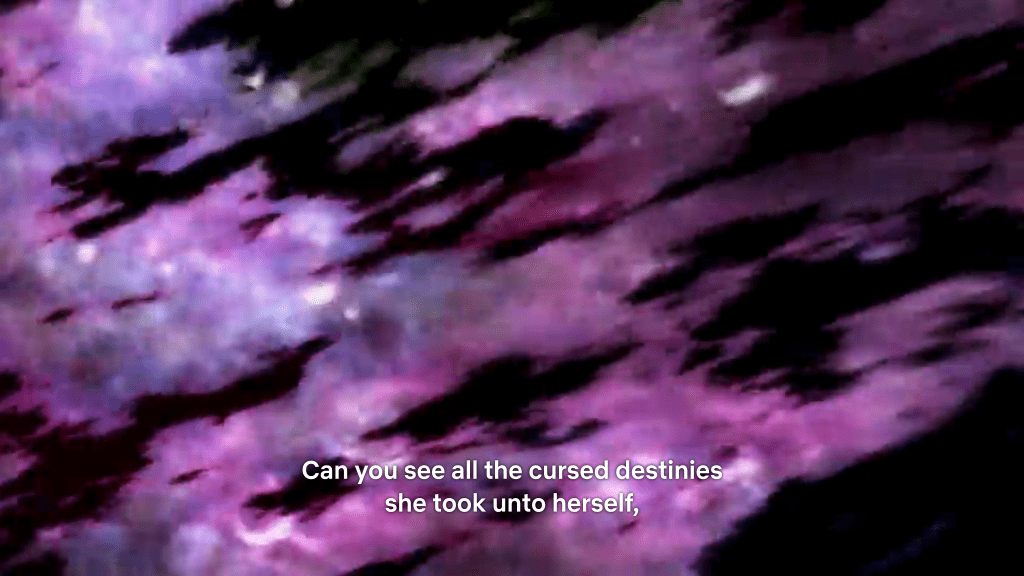
As a kid, I used to think I would have done a much better job in the Garden. That maybe humanity wouldn’t even have fallen. I had no desire to usurp God—who would want the responsibility? Well, I may have been a pretty obedient child, but I was also impatient. I was born breach and prematurely, and used to joke that I kicked my way out because I was fed up of waiting. And it was, in part, that kind of impatience that led to the fall. The serpent tempted Adam and Eve—yes, to disobey God, to mistrust him, but also to take matters into their own hands and act out of impatience, rather than to trust God with their “destiny and its timing” (Psalm 16:5 TPT). Maybe I wouldn’t have saved humanity after all.
Gaining the knowledge of good and evil happened out of season for humanity, which is what rendered it harmful—a lot like how the magical girls’ wishes, though well-intentioned and objectively good, fed into curses and ultimately transformed them into witches: they were impatient to fix things according to their own judgement. In their case, it was the interference of an alien race that turned their wilful acts into destructive curses. Kyuubey and the Incubators are very much the serpents in the garden of these young women’s lives. But Madoka, like God, chose to pay a personal price to redeem rather than reset. She rewrites the laws of the universe to make redemption possible, in an attempt to overwrite the rule of balance (curses for wishes; destruction for miracles) with the reckless imbalance of grace. She seeks to throw off the tyranny of karma—a yoke that our savior, too, lifts away from us. In so doing, she transforms the legacy of the magical girls, preventing it from becoming bitter and destructive.
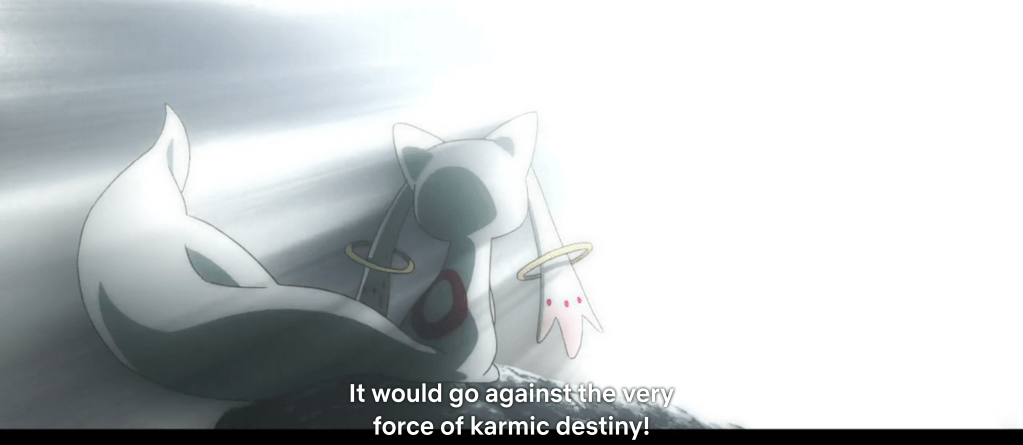
Jesus did the same with the legacy of the trees and the fruit that shouldn’t have been eaten when or how it was. In him, we have the ability to receive knowledge, understanding, wisdom, and a mind and spirit strong enough to handle them without it turning into a curse—the mind of Christ himself (1 Corinthians 2:16). In him, we have eternal life. He redeems the trees and that original mistake, just as Madoka redeems the magical girls’ wishes. Because they were all actually intended for good.
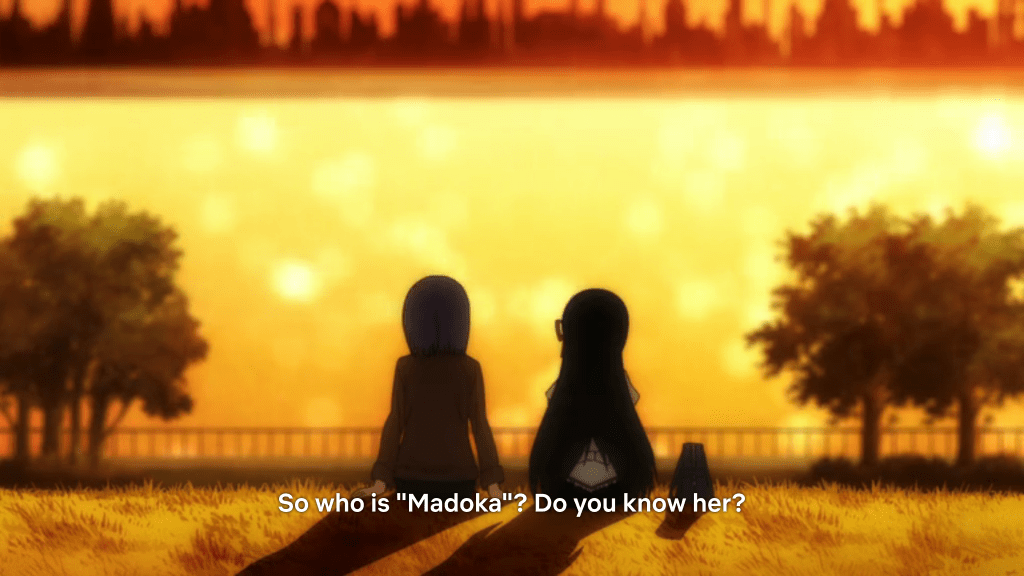
I’ll always be grateful to Madoka for teaching me this—for prompting me to ask my God a question and discover a piece of his heart that I never suspected was there.
And so my journey with God through anime began. Little did I know what an adventure I was in for! And it’s been made all the richer for having learned to ask this all-important question every time I start a new series: “God, will you watch this one with me?”
Puella Magi Madoka Magica can be streamed on Netflix, Funimation, and Crunchyroll. And I really recommend that you do it.
- Miracles from the Gutter, Turkey ep. 12 - 12.03.2025
- The Grace of Turkey: A Bowling Girls’ Gospel - 11.26.2025
- Review: Riviere & the Land of Prayer, Vol. 3 (Light Novel) - 11.20.2025


(Violet Evergarden, Non Non Biyori, Laid-Back Camp, … A Place Further Than The Universe)
FTFY 🙂
YES!!!! You are so right! How could I have forgotten??? That was actually the second anime I watched, and it blew me away–so very moving and talk about depth. I will edit and add it in to the main post now.
🙌Props, mistersaxon! 🙌
[…] 2 of 2 In celebration of the 10th Anniversary of Puella Magi Madoka […]
I commend you for being brave enough to legitimately draw the comparison and question of God’s relation to anime. It seems strange to think that this proposition would draw in the side eye of lots of people, considering if you are to believe that God is in everything (a concept that most I meet don’t seem to think is that ridiculous) that of course he’d work through this medium as well. I myself am not specifically a Christian, but anime has helped me on my journey towards the divine more than anything else. You may even say that it’s what started it.
On my last rewatch of Madoka, I found myself overwhelmed with emotion at the final episode for how truly it spoke to the nature of the divine. In previous viewings, I had not made as many personal bounds on my spiritual journey. But having learned what I have since then, it brought me not only to an understanding, but to the actual feeling of the form of God’s boundless love and compassion. And that even the naive wishes of an ordinary girl, can make boundless good, and help us to emulate the true nature of ourselves for the benefit of others. That, being our Christ/Buddha Nature, Godself, Holy Spirit, whatever name you have for it. Absolute good that transcends the limitations of a cruel reality is achievable simply by the unhindered will to incarnate true love and compassion in whatever form you take.
This only speaks to the importance of stories that are for the most part, unbelievably dark and oppressing. Because anything short would be to downplay the nature of the dark and oppressing forces that share this reality we inhabit. And only a show that does nothing to soften the blows, (as reality would pay us no such mercy) can send a message that has the legitimate capability to alter the state of being in the phenomenalized being that witnessed it. And thus, that being can take that energy, that love, and use it’s wisdom to pass it on to others.
Your article has moved me very deeply, and had recontextualized the contributions of Christian wisdom in my personal worldview. The idea that God did not set us up for failure with the tree of knowledge, and that he did not simply reset to a blissful state of being out of lack of care for our wellbeing, but because he and we made truly worthy contribution even in times of overwhelming darkness, and that it was important enough that God itself wished for it to be preserved into the coming era. Thank you for your free, and compassionate divulgence of your personal wisdom. I can see that God is with you through both your religion and this experience we share with each other; the experience of God through art crafted with honest and kind hands
You have my immense gratitude and respect
This is such a rich and all-round fantastic comment — I really appreciate your taking the time to articulate and share this! (Apologies for the tardy reply — I’ve been away this month.)
Yes, it was such a surprise to me too to find that faith communities can often be hostile to anime. What drew me most to anime is the strong spiritual aspect and the fact that most stories take place in a world where it is absolutely normal to acknowledge that “there are more things in heaven and Earth, Horatio, than are dreamt of in your philosophy,” as a certain Danish Prince phrased it!
And also, like you said, that the darkness is acknowledged just as palpably as the light. This is definitely one of the things I most appreciate about Madoka, too. I grew up with a form of Christianity that only talked about godly spiritual realities and ignored the darkness, which made for some rude awakenings down the road. It’s so important to be able to recognize and face the darkness, the brokenness, the chaos of this world and the human journey, but also to see it in relation to the light, the redemption and the creative imperative of the divine; that is, to be able to find a hope that is real, that knows the stakes, and yet doesn’t unravel in the face of suffering and seeming silence.
Probably my greatest journey in faith has been to really begin to grasp what it means that “God is good”. Madoka and that conversation with Sayaka made me realize I was letting “God is a punisher” serve as my framework, even though it’s contrary to my own experience and who I know him to be in my life and through history. Danny Silk has a great book about how we are addicted to a “punishment paradigm” and just how harmful it is to us personally, to our relationships, and society. (And how to get over it!)
I’m so moved that this piece spoke to you — this is the most meaningful piece to me personally that I’ve written and it means so much to me to hear that it has spoken positively into someone else’s life too. Truly, thank you so much for writing!
Blessings to you as you continue to dive deeply into the divine through anime!
[…] to save the world and inject an unforgiving karmic system with grace resonated so powerfully. And not just with me, as I soon learned, but with pretty much all of Christian […]
[…] at Beneath the Tangles, we talk a lot about how God speaks to us through anime, manga, light novels, and other aspects of otaku culture. In fact, we write […]
[…] God is offering me. I forget his compassion, his mercy, and the fact that he actually loves and enjoys humanity and is not just constantly trying to get us to be better and do better and think and speak better […]
[…] a stronger person. And as I indulged in my sometimes weird interests (see anime), I learned that God would watch along with me, too, encouraging me to use my passion in a way that would put me exactly where I was meant to be. […]
[…] pull off these surprises. After a while, we should see the punches coming. But like other great shows, it is astute. It takes advantage of what we’re accustomed to, what worldly logic would […]